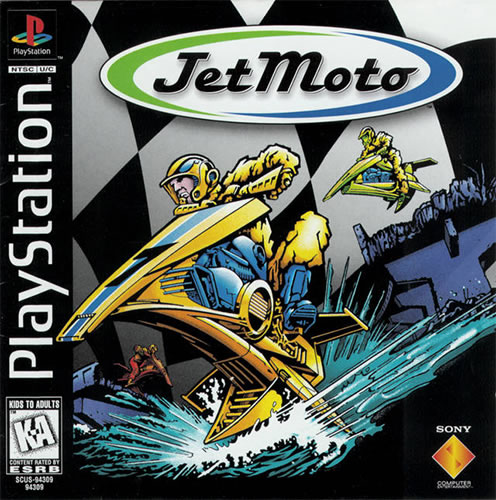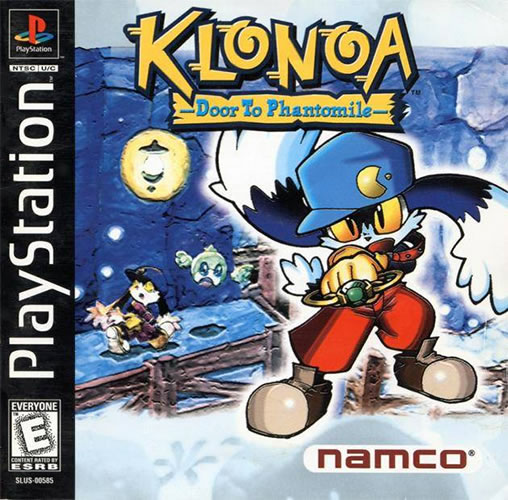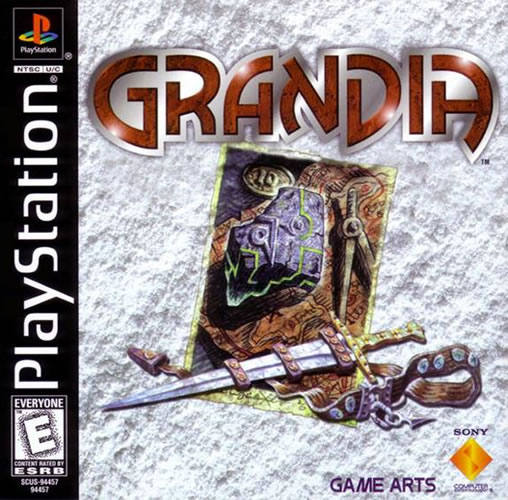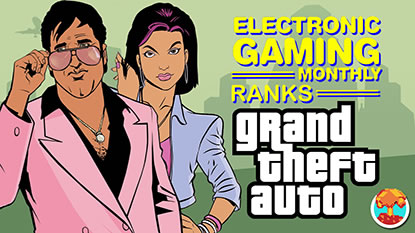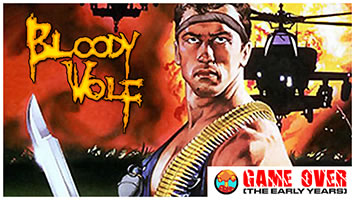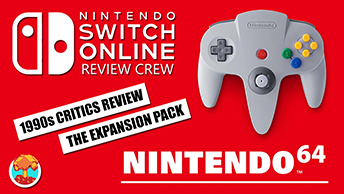- CLASSIC MAGAZINES
- REVIEW CREW
A show recapping what critics thought back
when classic games first came out! - NEXT GENERATION'S BEST & WORST
From the worst 1-star reviews to the best
5-stars can offer, this is Next Generation! - NINTENDO POWER (ARCHIVE)
Experience a variety of shows looking at the
often baffling history of Nintendo Power! - MAGAZINE RETROSPECTIVE
We're looking at the absolutely true history of
some of the most iconic game magazines ever! - SUPER PLAY'S TOP 600
The longest and most ambitious Super NES
countdown on the internet! - THEY SAID WHAT?
Debunking predictions and gossip found
in classic video game magazines! - NEXT GENERATION UNCOVERED
Cyril is back in this spin-off series, featuring the
cover critic review the art of Next Generation! - HARDCORE GAMER MAGAZING (PDF ISSUES)
Download all 36 issues of Hardcore Gamer
Magazine and relive the fun in PDF form!
- REVIEW CREW
- ELECTRONIC GAMING MONTHLY
- ELECTRONIC GAMING MONTHLY RANKS
From Mario to Sonic to Street Fighter, EGM
ranks classic game franchises and consoles! - ELECTRONIC GAMING MONTHLY BEST & WORST
Counting down EGM’s best and worst reviews
going year by year, from 1989 – 2009! - ELECTRONIC GAMING BEST & WORST AWARDS
11-part video series chronicling the ups and
downs of EGM’s Best & Worst Awards!
- ELECTRONIC GAMING MONTHLY RANKS
- GAME HISTORY
- GAME OVER: STORY BREAKDOWNS
Long-running series breaking down game
stories and analyzing their endings! - A BRIEF HISTORY OF GAMING w/ [NAME HERE]
Real history presented in a fun and pithy
format from a variety of game historians! - THE BLACK SHEEP
A series looking back at the black sheep
entries in popular game franchises! - INSTANT EXPERT
Everything you could possibly want to know
about a wide variety of gaming topics! - FREEZE FRAME
When something familiar happens in the games
industry, we're there to take a picture! - I'VE GOT YOUR NUMBER
Learn real video game history through a series
of number-themed episodes, starting at zero! - GREAT MOMENTS IN BAD ACTING
A joyous celebration of some of gaming's
absolute worst voice acting!
- GAME OVER: STORY BREAKDOWNS
- POPULAR SHOWS
- DG NEWS w/ LORNE RISELEY
Newsman Lorne Riseley hosts a regular
series looking at the hottest gaming news! - REVIEW REWIND
Cyril replays a game he reviewed 10+ years
ago to see if he got it right or wrong! - ON-RUNNING FEUDS
Defunct Games' longest-running show, with
editorials, observations and other fun oddities! - DEFUNCT GAMES QUIZ (ARCHIVE)
From online quizzes to game shows, we're
putting your video game knowledge to the test!- QUIZ: ONLINE PASS
Take a weekly quiz to see how well you know
the news and current gaming events! - QUIZ: KNOW THE GAME
One-on-one quiz show where contestants
find out if they actually know classic games! - QUIZ: THE LEADERBOARD
Can you guess the game based on the classic
review? Find out with The Leaderboard!
- QUIZ: ONLINE PASS
- DEFUNCT GAMES VS.
Cyril and the Defunct Games staff isn't afraid
to choose their favorite games and more! - CYRIL READS WORLDS OF POWER
Defunct Games recreates classic game
novelizations through the audio book format!
- DG NEWS w/ LORNE RISELEY
- COMEDY
- GAME EXPECTANCY
How long will your favorite hero live? We crunch
the numbers in this series about dying! - VIDEO GAME ADVICE
Famous game characters answer real personal
advice questions with a humorous slant! - FAKE GAMES: GUERILLA SCRAPBOOK
A long-running series about fake games and
the people who love them (covers included)! - WORST GAME EVER
A contest that attempts to create the worst
video game ever made, complete with covers! - LEVEL 1 STORIES
Literature based on the first stages of some
of your favorite classic video games! - THE COVER CRITIC
One of Defunct Games' earliest shows, Cover
Critic digs up some of the worst box art ever! - COMMERCIAL BREAK
Take a trip through some of the best and
worst video game advertisements of all time! - COMIC BOOK MODS
You've never seen comics like this before.
A curious mix of rewritten video game comics!
- GAME EXPECTANCY
- SERIES ARCHIVE
- NINTENDO SWITCH ONLINE ARCHIVE
A regularly-updated list of every Nintendo
Switch Online release, plus links to review! - PLAYSTATION PLUS CLASSIC ARCHIVE
A comprehensive list of every PlayStation
Plus classic release, including links! - RETRO-BIT PUBLISHING ARCHIVE
A regularly-updated list of every Retro-Bit
game released! - REVIEW MARATHONS w/ ADAM WALLACE
Join critic Adam Wallace as he takes us on a
classic review marathon with different themes!- DEFUNCT GAMES GOLF CLUB
Adam Wallace takes to the links to slice his way
through 72 classic golf game reviews! - 007 IN PIXELS
Adam Wallace takes on the world's greatest spy
as he reviews 15 weeks of James Bond games! - A SALUTE TO VAMPIRES
Adam Wallace is sinking his teeth into a series
covering Castlevania, BloodRayne and more! - CAPCOM'S CURSE
Adam Wallace is celebrating 13 days of Halloween
with a line-up of Capcom's scariest games! - THE FALL OF SUPERMAN
Adam Wallace is a man of steel for playing
some of the absolute worst Superman games! - THE 31 GAMES OF HALLOWEEN
Adam Wallace spends every day of October afraid
as he reviews some of the scariest games ever! - 12 WEEKS OF STAR TREK
Adam Wallace boldly goes where no critic has
gone before in this Star Trek marathon!
- DEFUNCT GAMES GOLF CLUB
- DAYS OF CHRISTMAS (ARCHIVE)
Annual holiday series with themed-episodes
that date all the way back to 2001!- 2015: 30 Ridiculous Retro Rumors
- 2014: 29 Magazines of Christmas
- 2013: 29 Questionable Power-Ups of Christmas
- 2012: 34 Theme Songs of Christmas
- 2011: 32 Game Endings of Christmas
- 2010: 31 Bonus Levels of Christmas
- 2009: 30 Genres of Christmas
- 2008: 29 Controls of Christmas
- 2007: 34 Cliches of Christmas
- 2006: 33 Consoles of Christmas
- 2005: 32 Articles of Christmas
- 2004: 31 Websites of Christmas
- 2003: 29 Issues of Christmas
- 2002: 28 Years of Christmas
- 2001: 33 Days of Christmas
- NINTENDO SWITCH ONLINE ARCHIVE
- REVIEW ARCHIVE
- FULL ARCHIVE
PlayStation Plus: 1990s Critics Review Grandia, Jet Moto and Klonoa: Door of Phantomile
Remember when Sony promised to release classic PlayStation games on their online service and then ignored them for a bunch of months in a row? Well, good news, everybody, the OG PlayStation games are back on PS Plus. That's right, today subscribers will have access to three old school PS1 games, including Grandia, Jet Moto and Klonoa: Door to Phantomile. These are three popular games, but are any of them worth playing? To answer that question, I decided to flip through the pages of Electronic Gaming Monthly, Next Generation, PSM and more classic magazines to see what critics said back when these games first came out. So fuel up your hoverbike and get ready to slay a dragon, because this is a very eclectic episode of PlayStation Plus Review Crew!
After the early success of PlayStation racing games like Ridge Racer and wipEout, Sony wanted to ensure that their 32-bit system was where speed demons went to get their fix. One of the new racing games readied for the PlayStation's second wave in 1996 was Jet Moto, a game that mixed motorcycles and hovercrafts that was developed by the same people who gave us Twisted Metal. This allowed developer SingleTrac the opportunity to create new and unique tracks that could anything from a swamp level to an icy road in a snowy mountain range. And because we're dealing with hoverbikes, we're given a cool grapple ability that makes this game feel different from every other racer on the market. All that sounds great on paper, but were the critics impressed?
The answer to that question depends entirely on which magazine you subscribed to back in the day. Electronic Gaming Monthly, for example, loved the game, giving it an average score of 9.25 out of 10. Joe couldn't stop raving: “I love this game. The developers at SingleTrac have come away with another winner. The tracks are long and interesting with a number of challenging obstacles like trees, stumps, and even a waterfall. The well-designed tracks make this one of the best racing games around.” Todd agreed, giving it a 9 and calling it the PlayStation's WaveRace. “The ten tracks are very challenging as well as exciting. When your watercycle drops 200 feet, your stomach goes along with it. The physics of this game are incredible, and this game is full of gut-wrenching action. The two-player mode is also a nice touch. The sound and visual effects of the mud and water squirting off of the back of your water cycle are incredible. It's a solid, well-designed game.”
While EGM may have fallen in love with Jet Moto, the same could not be said for some of the other magazines. Computer & Video Games ended up going as low as a 2 out of 5 in issue 185. That isn't too far off from GamePro, who gave it a 2.5 out of 5. “These bikes handle like their mired in molasses – it's tough to get a feel for the floaty handling on turns and jumps. Jet Moto's race dynamics – particularly how skilled the A.I. is and how poorly your bike responds to collisions and catching air – are so unfair and unrealistic that you'll stomp your controller to pieces. Steer clear.”
For the most part, the rest of the critics landed somewhere between these two extremes. Game Fan liked the game, giving it an average score of 87%. Ultra Game Players agreed, giving the game a solid 8.4 out of 10. And then there's the notoriously grumpy Next Generation, who gave it a 4 out of 5 and argued that “despite these odd control and graphic characteristics, Jet Moto remains a lot of fun. With intense, challenging races featuring twenty competitors on ten unique tracks, it never fails to be compelling. Jet Moto can perhaps best be described as a game in which the whole equals more than the sum of its parts.”
That's a perfect way to describe this creative racing game. It takes a little getting used to, but I'm firmly on the “pro” side of the argument, and wouldn't mind seeing Jet Moto make a comeback on the PlayStation 5. Make it happen Sony.
After Nintendo, Sega and pretty much every other 16-bit developer trotted out their own mascot platformers, many wondered if the genre had been run into the ground. If this type of game was going to exist in the ever-changing 32-bit ecosystem, then companies knew that they were going to need to come up with something bigger, better and, most importantly, deeper than we got on the Genesis and Super NES. This is how Namco approached Klonoa: Door to Phantomile, a breath-taking adventure with imaginative worlds and deep gameplay that will take some practice to master. Sadly, the cute and cuddly Klonoa couldn't gain much traction in America, as many Western gamers were looking for darker, grittier titles that pushed the boundaries. But the real question remains, what did critics think at the time?
Once again, it comes down to which magazine you trusted in 1998. For example, if you subscribed to Computer & Video Games, then you might not think Klonoa was a big deal. Giving it a 3 out of 5, CVG concludes that “rather than just being an exercise in platforming skills, Klonoa's clever level design gives it a satisfying puzzle element. Part of the fun is the quality of the characters, the way they behave, as well as the way they look. They're all cute in a Japanese way, and I liked the way you have to use the different enemies to make progress. I even liked the way all the characters speak in weird squeaks. Klonoa's look and low difficulty make it perfect for young players, but more experienced gamers should also find it satisfying and fun to play.”
On the other hand, there were a number of magazines that absolutely fell in love with the little guy. Hyper was one of them, giving the game a 91%. You also saw Game Fan, who went just a little higher with a 93%. Knightmare loved this game, explaining it like this: “Old school 2D mechanics augmented with crisp, beautiful 3D graphics and some magical tunes make Klonoa a delightful platformer that is guaranteed to put a smile on even the most jaded gamers face. It's not particularly long, nor particularly tough, but the experience is such an enjoyable one that you're not liable to care.” Glitch agreed, “I mean, just look at him! Stare at all that ludicrous CG. Swim in those happy tunes. Klonoa's presentation is incredible. 60 frames per second looks AWESOME in a side-scroller. Mad A/V aside, the gameplay is also very close to perfection. The grabbing play-mechanic is cool, I think it's been incorporated into the gameplay well, and the control is tight. You see, just like NiGHTS, Klono's gameplay is accepted as being near-perfect. And after you come to this realization, the only thing left is complete immersion.”
It's probably worth noting that Edge was not nearly as impressive with Klonoa as the rest of the critics, giving it a 7 out of 10. Game Informer liked it a little more than that, giving it a score of 8 out of 10. And then there's PSM, who went as high as a 4.5 out of 5 in their seventh issue. “Klonoa is a top-notch production throughout, exemplifying everything we've come to know and love about the platform genre. And while the game may not shatter the platformer mold, it offers enough in the way of brilliant design and superb gameplay that you could care less. For fans of the genre, Klonoa is a must-have game in the truest sense. Here's hoping that Namco's first steps into uncharted territory are only an indication of things to come.”
Even if a couple critics weren't enthusiastic in their praise, there's no doubt that Klonoa is a superb platformer that fans of the genre will love. If you've never had a chance to check out this brilliant series, definitely do so now.
When it was first released in 1997 on the Sega Saturn, many doubted that American gamers would get their hands on Game Arts' brilliant role-playing game Grandia. However, all this changed with the worldwide success of Final Fantasy VII, a seismic shift that convinced formerly-reluctant developers to ride the role-playing tsunami hitting the West. Grandia is one of the games that took advantage of people's sudden interest in RPGs, giving gamers an epic adventure with a fun story, great characters and tons of bosses to fight. Best of all, it was easy to jump into and accessible to all, making this the perfect choice for American gamers who were only now warming up to the genre. These days, Grandia is considered a true 32-bit masterpiece, but what did the critics say back in 1999?
Unlike the previous two games we talked about today, Grandia received unanimous praise from the critics. More than anything else, this felt like a win for gamers. When you real Electronic Gaming Monthly's reviews, you can tell that they held the game in high-esteem, so the idea that it was finally coming to America was a big deal. Just ask Crispin, who started his review this way: “A legendary Saturn RPG, Gandia had a lot to live up to when I sat down to play it. This thing didn't let me down. Sure, the characters are too cutesy for my taste. The voice acting is lame and the music is so-so. But the epic story and – still better – awesome dungeons make up for the shortcomings. At least you'll finally see what all the fuss was about.” Shoe agreed, though decided to stick his toe in the system wars in his review: “While it's unfortunate the U.S. Saturn didn't grab bragging rights to this title, I'm happy Grandia is out here at all. The game is sweeeet. It has great graphics, an epic storyline, tons of characters to interact with and a kick-ass combat system that won't have you dreading that next, repetitive RPG battle. Don't accidentally miss out on one of the best RPGs of the year just because it doesn't have the Final Fantasy VIII level of hype surrounding it.” Electronic Gaming Monthly gave the game an average score of 9 out of 10.
That's perfectly in line with the 4.5 out of 5 Grandia got from GamePro, as well as the 4.5 out of 5 from the Official U.S. PlayStation Magazine. It also lines up with the 90% average you saw over at Game Fan. As one of the few magazines to review both the PlayStation and Saturn versions, Game Fan has a unique perspective. Eggo explains that “Game Arts' baby enters an already-ugly RPG war on the PlayStation, but it's still one of the best in its class, and should do well. Unfortunately, the Saturn rev didn't suffer from as much slowdowns as this, and the English voices are ... unprofessional. But don't let these blemishes dissuade you from purchasing this title, which is better than Final Fantasy VIII.” Fury liked it, but couldn't stop comparing Grandia to other RPGs: “I must admit that I love nearly all things Saturn-related. Though Panzer Saga was my RPG of choice, Grandia had an excellent story and adorable characters. Though the PS version is identical to its Saturn counterpart, it sadly might fall victim to the fact that there are just too many RPGs heading to the PlayStation. While I would recommend this title over Jade Cocoon, it has some hefty competition with the likes of Final Fantasy VIII and Thousand Arms.”
When it comes to the outliers, you pretty much have Game Informer, who gave Grandia an average score of 7.25 out of 10. Next Generation was also a little lower than the pack, though with a 4 out of 5, it wasn't by much. “There is a hitch in the game's battle engine similar to Final Fantasy VIII's Guardian Force, you must use individual spells for them to increase levels, meaning you're going to be fighting a lot just to make your magic worth using. Add to this some questionable voice acting and Grandia just misses the five-star rating. But with its strong character and engaging storyline, you won't mind a bit.”
This is, without a doubt, one of those classic role-playing games that genre fans absolutely need to play. Sure, there's an HD version that pretties things up a bit, but if you haven't play Grandia and have PlayStation Plus, now is a great time to see what all the hype was about. It's a real gem.
| Publication | Scores |
|---|---|
| Electronic Gaming Monthly | 9.25/10 |
| Die Hard Game Fan | 87% |
| Ultra Game Players | 8.4/10 |
| Next Generation | 4/5 |
| GamePro | 2.5/5 |
| Computer + Video Games | 2/5 |
| AVERAGE SCORE | 72% |
The answer to that question depends entirely on which magazine you subscribed to back in the day. Electronic Gaming Monthly, for example, loved the game, giving it an average score of 9.25 out of 10. Joe couldn't stop raving: “I love this game. The developers at SingleTrac have come away with another winner. The tracks are long and interesting with a number of challenging obstacles like trees, stumps, and even a waterfall. The well-designed tracks make this one of the best racing games around.” Todd agreed, giving it a 9 and calling it the PlayStation's WaveRace. “The ten tracks are very challenging as well as exciting. When your watercycle drops 200 feet, your stomach goes along with it. The physics of this game are incredible, and this game is full of gut-wrenching action. The two-player mode is also a nice touch. The sound and visual effects of the mud and water squirting off of the back of your water cycle are incredible. It's a solid, well-designed game.”
While EGM may have fallen in love with Jet Moto, the same could not be said for some of the other magazines. Computer & Video Games ended up going as low as a 2 out of 5 in issue 185. That isn't too far off from GamePro, who gave it a 2.5 out of 5. “These bikes handle like their mired in molasses – it's tough to get a feel for the floaty handling on turns and jumps. Jet Moto's race dynamics – particularly how skilled the A.I. is and how poorly your bike responds to collisions and catching air – are so unfair and unrealistic that you'll stomp your controller to pieces. Steer clear.”
For the most part, the rest of the critics landed somewhere between these two extremes. Game Fan liked the game, giving it an average score of 87%. Ultra Game Players agreed, giving the game a solid 8.4 out of 10. And then there's the notoriously grumpy Next Generation, who gave it a 4 out of 5 and argued that “despite these odd control and graphic characteristics, Jet Moto remains a lot of fun. With intense, challenging races featuring twenty competitors on ten unique tracks, it never fails to be compelling. Jet Moto can perhaps best be described as a game in which the whole equals more than the sum of its parts.”
That's a perfect way to describe this creative racing game. It takes a little getting used to, but I'm firmly on the “pro” side of the argument, and wouldn't mind seeing Jet Moto make a comeback on the PlayStation 5. Make it happen Sony.
| Publication | Scores |
|---|---|
| Game Fan | 92% |
| Hyper | 91% |
| PSM | 4.5/5 |
| Game Informer | 8/10 |
| Edge | 7/10 |
| Computer + Video Games | 3/5 |
| AVERAGE SCORE | 81% |
Once again, it comes down to which magazine you trusted in 1998. For example, if you subscribed to Computer & Video Games, then you might not think Klonoa was a big deal. Giving it a 3 out of 5, CVG concludes that “rather than just being an exercise in platforming skills, Klonoa's clever level design gives it a satisfying puzzle element. Part of the fun is the quality of the characters, the way they behave, as well as the way they look. They're all cute in a Japanese way, and I liked the way you have to use the different enemies to make progress. I even liked the way all the characters speak in weird squeaks. Klonoa's look and low difficulty make it perfect for young players, but more experienced gamers should also find it satisfying and fun to play.”
On the other hand, there were a number of magazines that absolutely fell in love with the little guy. Hyper was one of them, giving the game a 91%. You also saw Game Fan, who went just a little higher with a 93%. Knightmare loved this game, explaining it like this: “Old school 2D mechanics augmented with crisp, beautiful 3D graphics and some magical tunes make Klonoa a delightful platformer that is guaranteed to put a smile on even the most jaded gamers face. It's not particularly long, nor particularly tough, but the experience is such an enjoyable one that you're not liable to care.” Glitch agreed, “I mean, just look at him! Stare at all that ludicrous CG. Swim in those happy tunes. Klonoa's presentation is incredible. 60 frames per second looks AWESOME in a side-scroller. Mad A/V aside, the gameplay is also very close to perfection. The grabbing play-mechanic is cool, I think it's been incorporated into the gameplay well, and the control is tight. You see, just like NiGHTS, Klono's gameplay is accepted as being near-perfect. And after you come to this realization, the only thing left is complete immersion.”
It's probably worth noting that Edge was not nearly as impressive with Klonoa as the rest of the critics, giving it a 7 out of 10. Game Informer liked it a little more than that, giving it a score of 8 out of 10. And then there's PSM, who went as high as a 4.5 out of 5 in their seventh issue. “Klonoa is a top-notch production throughout, exemplifying everything we've come to know and love about the platform genre. And while the game may not shatter the platformer mold, it offers enough in the way of brilliant design and superb gameplay that you could care less. For fans of the genre, Klonoa is a must-have game in the truest sense. Here's hoping that Namco's first steps into uncharted territory are only an indication of things to come.”
Even if a couple critics weren't enthusiastic in their praise, there's no doubt that Klonoa is a superb platformer that fans of the genre will love. If you've never had a chance to check out this brilliant series, definitely do so now.
| Publication | Scores |
|---|---|
| Electronic Gaming Monthly | 9/10 |
| Game Fan | 90% |
| GamePro | 4.5/5 |
| Official U.S. PlayStation Magazine | 4.5/5 |
| Next Generation | 4/5 |
| Game Informer | 7.75/10 |
| AVERAGE SCORE | 86% |
Unlike the previous two games we talked about today, Grandia received unanimous praise from the critics. More than anything else, this felt like a win for gamers. When you real Electronic Gaming Monthly's reviews, you can tell that they held the game in high-esteem, so the idea that it was finally coming to America was a big deal. Just ask Crispin, who started his review this way: “A legendary Saturn RPG, Gandia had a lot to live up to when I sat down to play it. This thing didn't let me down. Sure, the characters are too cutesy for my taste. The voice acting is lame and the music is so-so. But the epic story and – still better – awesome dungeons make up for the shortcomings. At least you'll finally see what all the fuss was about.” Shoe agreed, though decided to stick his toe in the system wars in his review: “While it's unfortunate the U.S. Saturn didn't grab bragging rights to this title, I'm happy Grandia is out here at all. The game is sweeeet. It has great graphics, an epic storyline, tons of characters to interact with and a kick-ass combat system that won't have you dreading that next, repetitive RPG battle. Don't accidentally miss out on one of the best RPGs of the year just because it doesn't have the Final Fantasy VIII level of hype surrounding it.” Electronic Gaming Monthly gave the game an average score of 9 out of 10.
That's perfectly in line with the 4.5 out of 5 Grandia got from GamePro, as well as the 4.5 out of 5 from the Official U.S. PlayStation Magazine. It also lines up with the 90% average you saw over at Game Fan. As one of the few magazines to review both the PlayStation and Saturn versions, Game Fan has a unique perspective. Eggo explains that “Game Arts' baby enters an already-ugly RPG war on the PlayStation, but it's still one of the best in its class, and should do well. Unfortunately, the Saturn rev didn't suffer from as much slowdowns as this, and the English voices are ... unprofessional. But don't let these blemishes dissuade you from purchasing this title, which is better than Final Fantasy VIII.” Fury liked it, but couldn't stop comparing Grandia to other RPGs: “I must admit that I love nearly all things Saturn-related. Though Panzer Saga was my RPG of choice, Grandia had an excellent story and adorable characters. Though the PS version is identical to its Saturn counterpart, it sadly might fall victim to the fact that there are just too many RPGs heading to the PlayStation. While I would recommend this title over Jade Cocoon, it has some hefty competition with the likes of Final Fantasy VIII and Thousand Arms.”
When it comes to the outliers, you pretty much have Game Informer, who gave Grandia an average score of 7.25 out of 10. Next Generation was also a little lower than the pack, though with a 4 out of 5, it wasn't by much. “There is a hitch in the game's battle engine similar to Final Fantasy VIII's Guardian Force, you must use individual spells for them to increase levels, meaning you're going to be fighting a lot just to make your magic worth using. Add to this some questionable voice acting and Grandia just misses the five-star rating. But with its strong character and engaging storyline, you won't mind a bit.”
This is, without a doubt, one of those classic role-playing games that genre fans absolutely need to play. Sure, there's an HD version that pretties things up a bit, but if you haven't play Grandia and have PlayStation Plus, now is a great time to see what all the hype was about. It's a real gem.
HOME |
CONTACT |
NOW HIRING |
WHAT IS DEFUNCT GAMES? |
NINTENDO SWITCH ONLINE |
RETRO-BIT PUBLISHING
Retro-Bit |
Switch Planet |
The Halcyon Show |
Same Name, Different Game |
Dragnix |
Press the Buttons
Game Zone Online | Hardcore Gamer | The Dreamcast Junkyard | Video Game Blogger
Dr Strife | Games For Lunch | Mondo Cool Cast | Boxed Pixels | Sega CD Universe | Gaming Trend
Game Zone Online | Hardcore Gamer | The Dreamcast Junkyard | Video Game Blogger
Dr Strife | Games For Lunch | Mondo Cool Cast | Boxed Pixels | Sega CD Universe | Gaming Trend
Copyright © 2001-2025 Defunct Games
All rights reserved. All trademarks are properties of their respective owners.
All rights reserved. All trademarks are properties of their respective owners.







